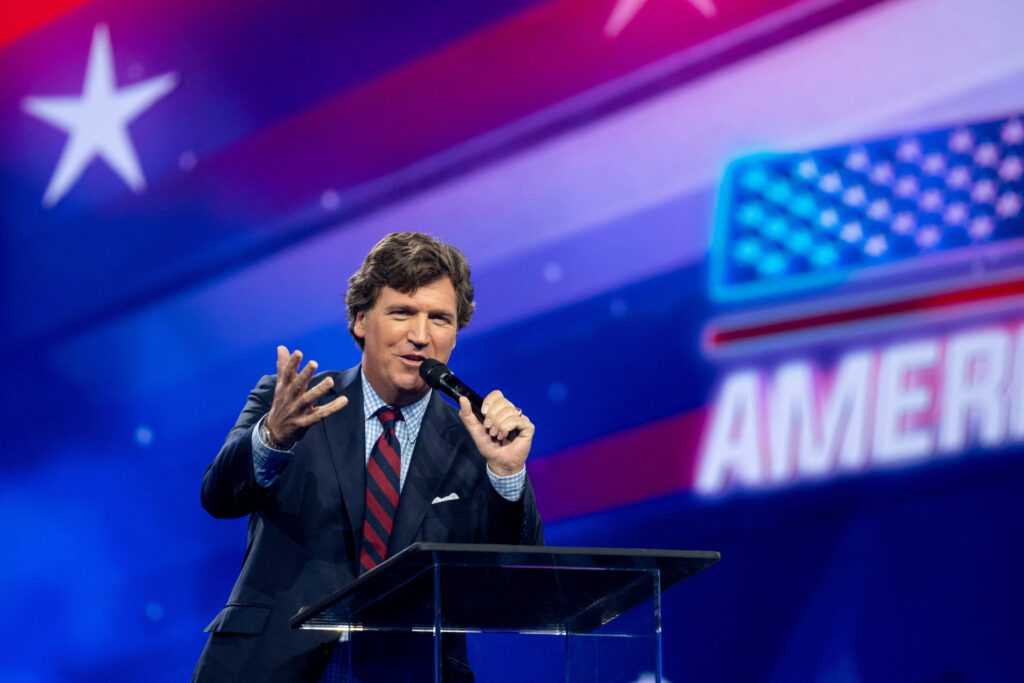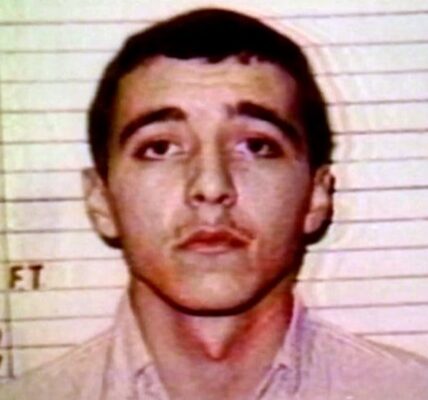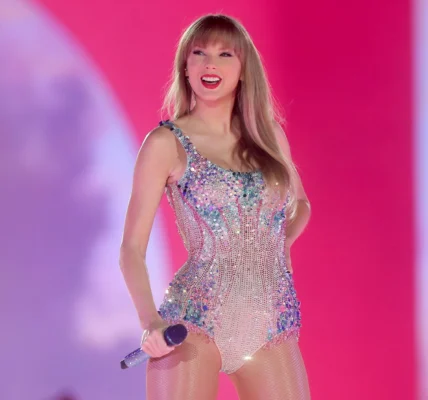Introduction:
Not many things are as striking in the world of foreign diplomacy and media manipulation as the recent discussion involving Russian President Vladimir Putin with American television presenter Tucker Carlson. Although the interview began as a journalistic project, it soon turned into an opportunity for Putin’s propaganda apparatus, which enabled him to carefully create a story that avoids attention and criticism while portraying Russia in a positive manner. We go into great detail in this study to examine the subtleties of this interview and analyze how Putin used Carlson’s softball strategy to his advantage and won a massive propaganda win that shaped opinions around the world.
Why Tucker Carlson was given permission to interview with Vladimir Putin is now clear.
The former Fox News anchor who is now an internet pundit mostly avoided criticizing the savage Russian dictator, whose war on Ukraine has killed hundreds of thousands of people needlessly, during the more than two-hour sit-down. Those who were hoping for a brutal exchange of blows were left bitterly disappointed by the interview’s protracted and meandering nature, during which Tucker himself seemingly went nowhere.

Carlson allowed the autocrat to manipulate the general population and tell his version of history, no matter how false, instead of pressing Putin on the many issues at hand, including the verifiable accusations that Russia has committed war crimes and the detention of opposition leader Alexei Navalny. Occasionally, while the presenter watched in confusion, Putin seemed to be teaching Carlson about historical events in between the voicing of complaints. In other words, or to put it more simply, Carlson gave Putin a platform to disseminate his propaganda to a worldwide audience with little to no investigation into his assertions.
CNN’s Chief International Correspondent Clarissa Ward said, “What you see from witnessing the first 45 minutes of this is that this is President Putin’s platform,” and that it was “clear from the very beginning” of the interview that Carlson did “not have control.”
Carlson even supported Putin’s stories in a few instances. One ridiculous deep state-style conspiracy theory put out by Putin, for example, is that the president of the United States is puppeteered by unelected officials at the Central Intelligence Agency, rather than the elected leaders themselves.
After Putin made the claim, Carlson summarised the bold story of the Russian leader with sincerity: “So, twice you’ve described US presidents choosing actions and then getting undermined by their agency heads.” “So, it seems that you’re explaining a system that, in your understanding, isn’t governed by elected officials?”
In response, Putin said, “That’s right, that’s right.”
Carlson never pursued the ridiculousness further.
Putin now has the ability to and will use this enormous propaganda win to manipulate the meeting to suit his own objectives. A look at how his own state-run media reported the episode should dispel any question that Putin did not consider the sit-down with Carlson to be a major victory. Putin’s spokesman hurried to magnify the conversation as soon as Carlson made it public online.
Putin’s allegation that Ukraine is a “artificial state” was reinforced by TASS, which dedicated a whole section of its website to exclusive coverage of the interview and highlighted the sit-down as the top item on its homepage. Large portions of the interview were carried on RT, the English-language broadcaster that is now banned from most of the West.
In one on-screen graphic, RT bragged, “Vladimmir Putin’s interview gains over 20 million viewers in the first two hours.”
All of this ought to be expected.
While Carlson used to be a critic of the Russian government, he has recently shifted, along with the GOP, to become a considerably more friendly figure toward the Putin-led state. Carlson has been anything but supportive of Kiev in his criticism on Russia’s savage assault on Ukraine; last year, the right-wing fanatic even compared Volodymyr Zelensky to rodents.
That is precisely the reason Putin gave his consent to the Carlson interview, after years of denials to real journalists who would have questioned the Russian president on a number of important subjects. Nor do you have to accept our word for it. This Monday, Dmitry Peskov, Putin’s personal spokesperson, informed reporters that Carlson was chosen because he “has an argument that differentiates it from the rest” of the Western media.
However, Carlson did gently question Putin for a little period of time. Towards the conclusion of the interview, Carlson questioned Putin on his willingness to “release” The Wall Street Journal writer Evan Gershkovich from jail. “He’s a kid, and maybe he might have violated your law in some way, but he’s not a super spy and everyone knows that,” Carlson remarked in response to Putin’s refusal to free Gershkovich at this time.
Despite Carlson’s support for Gershkovich’s instant release, his statement was not favorably received by The Journal. It was “disgraceful of Carlson to make the claim that Evan was ‘breaking [their] law,'” according to newspaper writer Ted Mann on X.
“He wasn’t,” Mann continued. Carlson is aware of it. Evan is a respectable, law-abiding reporter who is being held captive for geopolitical purposes. He need to be freed right now.
After the interview, a statement was also made by The Journal.
“Journalism is a legitimate profession, and Evan practices it. The article stated, “Any portrayal to the contrary is pure fiction.” “We continue to demand Evan’s immediate release. He was wrongfully arrested and wrongfully imprisoned by Russia for almost a year for carrying out his job.”

The Difficulty of Lacking Manpower:
The Bucks knew going into their game against the Suns that some of their top players would be unavailable due to injury and other reasons. They would thus need to depend on their bench players to step up and cover for their absent stars. The Bucks faced a daunting task in getting ready to face the Suns, who had players like Devin Booker and Chris Paul, because they were without important players like Giannis Antetokounmpo and Khris Middleton.
The Bucks did not give up in the face of overwhelming odds. Inspiring his squad, coach Mike Budenholzer emphasized the value of playing with passion and determination in every situation. As the game progressed, this way of thinking would come in handy as the Bucks showed their tenacity from the first tip-off to the last buzzer.
Crucial Times:
The Bucks’ tenacity and resolve were on display at a number of pivotal occasions during the contest. One such instance occurred early in the first quarter, as the Suns took the lead. The Bucks did not buckle under the strain; instead, they maintained their composure, weathering the storm and gradually regaining control of the game. Veteran guard Jrue Holiday, who assumed a leadership role while Antetokounmpo and Middleton were out, was a prime example of this tenacity in action.
The Bucks went on to battle valiantly throughout the game, not allowing the Suns to have an advantage. Both sides engaged in a high-intensity basketball exhibition where every possession turned into a fight. The Bucks maintained their focus on their objective and executed their game plan with accuracy and tenacity for the majority of the game, even though they were behind.
The Bucks mounted a valiant comeback in the fourth quarter, cutting into the Suns’ advantage and setting themselves up to take the win, with the game hanging in the balance. The Bucks’ tenacity was evident throughout this span as they refused to give up without a fight. But in the end, in spite of their greatest efforts, they were defeated by the Suns, who won 114-106.
A lesson discovered:
The game against the Suns taught the Bucks important lessons that they will carry forward, even if the ultimate result may not have been what they had planned for. First of all, it emphasized how crucial it is to be resilient and persistent in the face of difficulty. The Bucks, although lacking players, did not give in to excuses; instead, they concentrated on the things under their control and gave it their best on the court.
Second, the performance demonstrated the ability and depth of the Bucks’ roster. Under normal conditions, players would not have earned as much playing time as they did against the Suns, but several of them performed excellently under pressure. As they prepare to navigate the highs and lows of a demanding NBA season, this is encouraging for the team’s depth going ahead.
And last, the game was a helpful reminder of how competitive the NBA is. Regardless of their star power or apparent skill level, any team may win on any given night. Although the Bucks and Suns did not win the game, they did demonstrate that they are a formidable team in the face of difficulty.

conclusion:
In summary, the game between the star-studded Phoenix Suns and the struggling Milwaukee Bucks demonstrated tenacity, willpower, and a spirit of competition. The Suns were pushed to their limits by the Bucks, who stood their ground in the face of formidable obstacles and won the admiration of both fans and analysts. Despite the fact that the outcome may not have gone their way, the Bucks’ spirit and the lessons they acquired from the game will be valuable as they progress through the NBA season. It’s said that it matters more how you play the game than how well you win or lose. The Bucks gave it everything they had for their teammates and supporters on the field throughout this game, playing with passion, grit, and tenacity.




